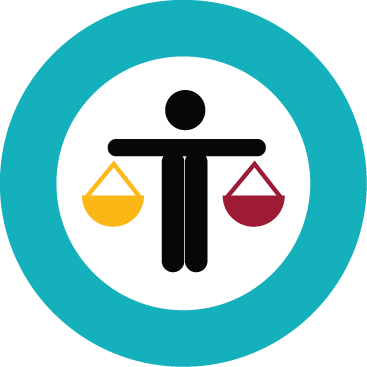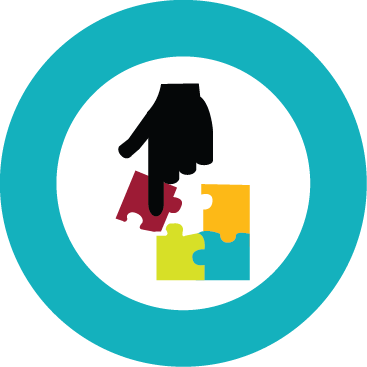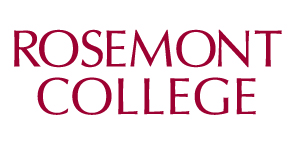General Education Curriculum
Rosemont College’s General Education Curriculum combines a carefully chosen selection of classes with 21st century educational practices to most effectively prepare graduating students for the future.
Rosemont doesn’t just train students for the workplace; it cultivates students’ cultural, religious and artistic sensibilities in order to improve the quality of their lives.
Students develop a sense of social responsibility and strong intellectual and practical skills that span all areas of study, and a demonstrated ability to apply everything they’ve learned to real-world settings.
Five Perennial Questions
- What skills do we need to function effectively in today’s society (both local and global)?
- Why is human culture so diverse, and what can we learn by studying the ways of others?
- Why is knowledge of the ideas and practices of natural science and mathematics essential to our lives?
- How should we live our lives, and how should we treat others?
- How can we transform what we learn in our lifetimes into actions that improve the quality of both our lives and the lives of others?
Why the Liberal Arts?
Think critically, approach problems from many angles, communicate clearly, and step into leadership roles.
Rosemont’s general education or core curriculum is a collection of classes that all undergraduate students must complete over and above the coursework needed for their major. While many balk that taking a math class as an English major or an art class as a pre-med student is a waste of time, they may not have fully considered how applying skills from one course can broaden their understanding of the other.
Mastery of our core curriculum, ethics, math, science, and religious studies to name a few, develops intellectual skills that lead learners to feel comfortable in many fields. General education is at the heart of what it means to be college-educated.
Our students practice how to communicate well verbally and in writing. They learn to analyze, to develop strategies for problem solving, to test ideas, and to put it all together in actionable plans all in the context of a broad understanding of the world.
Rosemont College graduates study how to look at complex issues and challenges from many angles and suggest ways in which to handle situations in a manner that may not be expected. Our graduates are prepared to handle careers that are just now being defined—ones that didn’t exist ten years ago.
STEM vs Liberal Arts
The great debate is if a professional STEM (Science, Technology, Engineering, Math) education is more important for our economy than one in the liberal arts. Many people think STEM guarantees a job right out of college where spending all one’s time in liberal arts does nothing but satisfy an inner passion with no specific career path in sight. But science and math are part of the liberal arts, and part of Rosemont’s general education requirement.
Three out of five employers report that it takes both specific and broad knowledge and skill to experience long-term success. This is why our general education program and studying the liberal arts are more important than ever. It makes a person a better leader and team member, a more strategic thinker, and more marketable.
General Education Components
Core Skills
 Mastering Core Skills is the most important thing students can do to get through their
college career. The First Year Connections Seminar introduces students to college life and to the Rosemont community while also teaching them how to do well in class, build
strong friendships, and form bonds with faculty who will personally guide them through
their Rosemont Experience.
Mastering Core Skills is the most important thing students can do to get through their
college career. The First Year Connections Seminar introduces students to college life and to the Rosemont community while also teaching them how to do well in class, build
strong friendships, and form bonds with faculty who will personally guide them through
their Rosemont Experience.
In First Year Composition, students master how to write a quality paper—everything from picking a research question and forming a thesis to organizing it and finding the best sources. Students build on these skills in Advanced Composition and Oral Communication, in which emphasis is placed on public speaking to conquer fears and clearly convey ideas.
Ethics in Action
Make the right decision, all the time.
 Human beings are faced with ethical dilemmas all the time, whether large or small,
and the decisions we make have the potential to influence a lot of people in very
significant ways. Unfortunately, coming to the right decision is often difficult.
One of the top skills employers desire is the ability to make ethical decisions. Ethics
in Action gives students the skills needed to engage in ethical reasoning, which leads
to creative, moral decisions.
Human beings are faced with ethical dilemmas all the time, whether large or small,
and the decisions we make have the potential to influence a lot of people in very
significant ways. Unfortunately, coming to the right decision is often difficult.
One of the top skills employers desire is the ability to make ethical decisions. Ethics
in Action gives students the skills needed to engage in ethical reasoning, which leads
to creative, moral decisions.
Courses in ethics along with the interesting, thought-provoking speakers and activities sponsored by Rosemont’s Institute for Ethical Leadership and Social Responsibility not only help students improve themselves, but also give them the confidence to stand up when something goes wrong and be a true leader.
Multiculturalism and Gender
The United States has gone through a complicated process to reach equality; however, we continue to experience issues that emerge from our “melting pot” society. Courses in Multiculturalism and Gender are designed to examine issues of gender and identity. Students learn about the construction of “identity” and how individuals choose their identity. This will help prepare students to interact and work with others who have different identities from theirs.
Foreign Language
 There are over seven billion people living in the world today. These seven billion
people, though similar, have a variety of different beliefs, customs, and cultures.
Courses in Foreign Languages are designed to provide students with knowledge of the
vast world we live in and the inhabitants we share it with. Students take courses
which teach them skills needed to navigate a global environment and become culturally-minded,
understanding individuals who can better experience the beauty the world has to offer.
There are over seven billion people living in the world today. These seven billion
people, though similar, have a variety of different beliefs, customs, and cultures.
Courses in Foreign Languages are designed to provide students with knowledge of the
vast world we live in and the inhabitants we share it with. Students take courses
which teach them skills needed to navigate a global environment and become culturally-minded,
understanding individuals who can better experience the beauty the world has to offer.
Creative Expression
 Creative Expression taps into students’ artistic sensibilities to improve their creativity.
Not only do students gain an appreciation for the arts, but they also improve in a
specific art discipline, such as painting, drawing, graphic design, and others, allowing
them to build an impressive portfolio.
Creative Expression taps into students’ artistic sensibilities to improve their creativity.
Not only do students gain an appreciation for the arts, but they also improve in a
specific art discipline, such as painting, drawing, graphic design, and others, allowing
them to build an impressive portfolio.
Unlocking a student’s creativity can also lead to better problem solving. Students might not create the next statue of David or hang their work of art in the Louvre, but the important thing is that they learn the basics of a form of art and learn how to express themselves creatively.
Social Science
Humans are complex, social beings and often act in mysterious ways. But there is an explanation for human behavior and courses in Social Sciences explore those roots. Drawing from a range of courses in psychology, political science, sociology, and economics, students learn exactly what motivates humans to do what we do and understand the external forces that drive us to behave a certain way. The more students understand people, the better they will get along with them.
Religious Studies
Religion has played a major role in our world over the course of human history. Whether on a personal, international, or political level, 85 percent of the world’s population identify with a religion. It has had an immense impact on our world in recent times and if we are to continue on an international path, students must have a basic understanding of the world’s major religions and their influences.
Students must be able to hold inter-religious dialogues and coexist with individuals who hold different beliefs. Courses in Religious Studies provide students with two distinct perspectives on religion. The first considers the Bible from a scholarly viewpoint, instead of a theological one, taking into consideration the ways in which the Bible influences other aspects of life and how to discuss its influence with other religions.
The second introduces students to the rich historical roots and traditions of Rosemont College in the Catholic faith. Religions have emphasized their differences for much of time, but because students take courses in Religious Studies they learn to recognize similarities, learn from one another, and improve their own worldview.
Problem Solving and Critical Thinking
Problems always present themselves in life and they can be simple or complex—from what to wear to which political candidate to vote for. No matter what the problem is, students need to be able to think clearly about problems and come to solutions. Courses in Problem Solving and Critical Thinking help students master the skills needed to handle the range and intricacy of the many problems they face during their lives. These include courses in mathematics and statistics which strengthen quantitative reasoning skills and logic to help form valid and sound arguments.
Natural Sciences
Science has given us the ability to send someone to the moon, instantly communicate with someone on the other side of the planet, save a life, and understand exactly how the world works. It all comes down to a relatively simple method that seeks to find answers to questions in a way that can be repeated and that stands the test of time. Courses in Science introduce students to the basics of either biology or chemistry so that they can have a better understanding of how the natural world works and how to utilize the concepts behind the scientific method in their everyday lives.
Humanities
Since the dawn of humanity, humans have set out to create a civilization that is far more beautiful and complex than anything imaginable. To fully understand where we are today, we must scrutinize from where we have come and the journey we’ve taken to get here. Courses in Humanities examine the histories, the great works of art and literature, and the big questions that humans have asked from the beginning of our existence.
With classes in history, English, and philosophy, students gain the knowledge to think critically, base their decisions on evidence, and improve their appreciation of the world in which we live.
Experiential Learning
 The Experiential Learning component of the curriculum is designed to give students
experience in the real world. The College offers several options for students to choose
from internships, study abroad trips, service learning, and undergraduate research.
These are coordinated by the Office of Post Graduate Success and Experiential Learning.
The Experiential Learning component of the curriculum is designed to give students
experience in the real world. The College offers several options for students to choose
from internships, study abroad trips, service learning, and undergraduate research.
These are coordinated by the Office of Post Graduate Success and Experiential Learning.
Students work with their faculty advisors and the experiential learning coordinator to select the most appropriate option based on their personal interests, is relevant to their studies, and completes the requirements for their major.
During and after the experiential learning component, students complete a project illustrating how it has contributed to their overall learning. Experiential learning is just one more way that Rosemont College is dedicated to preparing its students for successful futures.
Sustainability
 As our world population continues to expand and we continue to use our resources at
demonstrably unsustainable rates, we are forced to search for more manageable and
healthier ways of living. Some may view this as a challenge, but those who view it
as an opportunity to create a better world will be the most creative and most successful.
Courses in Sustainability teach students to examine the environmental problems we face both in the present and in the future that directly influence our way of
life.
As our world population continues to expand and we continue to use our resources at
demonstrably unsustainable rates, we are forced to search for more manageable and
healthier ways of living. Some may view this as a challenge, but those who view it
as an opportunity to create a better world will be the most creative and most successful.
Courses in Sustainability teach students to examine the environmental problems we face both in the present and in the future that directly influence our way of
life.
Senior Capstone
At the end of their college career, students will take the Senior Capstone component of the Rosemont Experience. Students take everything they have learned at Rosemont—from their major, general education curriculum, experiential learning, clubs, friends, faculty and more—and pull it all together in a culminating project. This project allows them to explore their passions and prove they’ve developed a well-rounded mind and what they have mastered in earning their degree.
